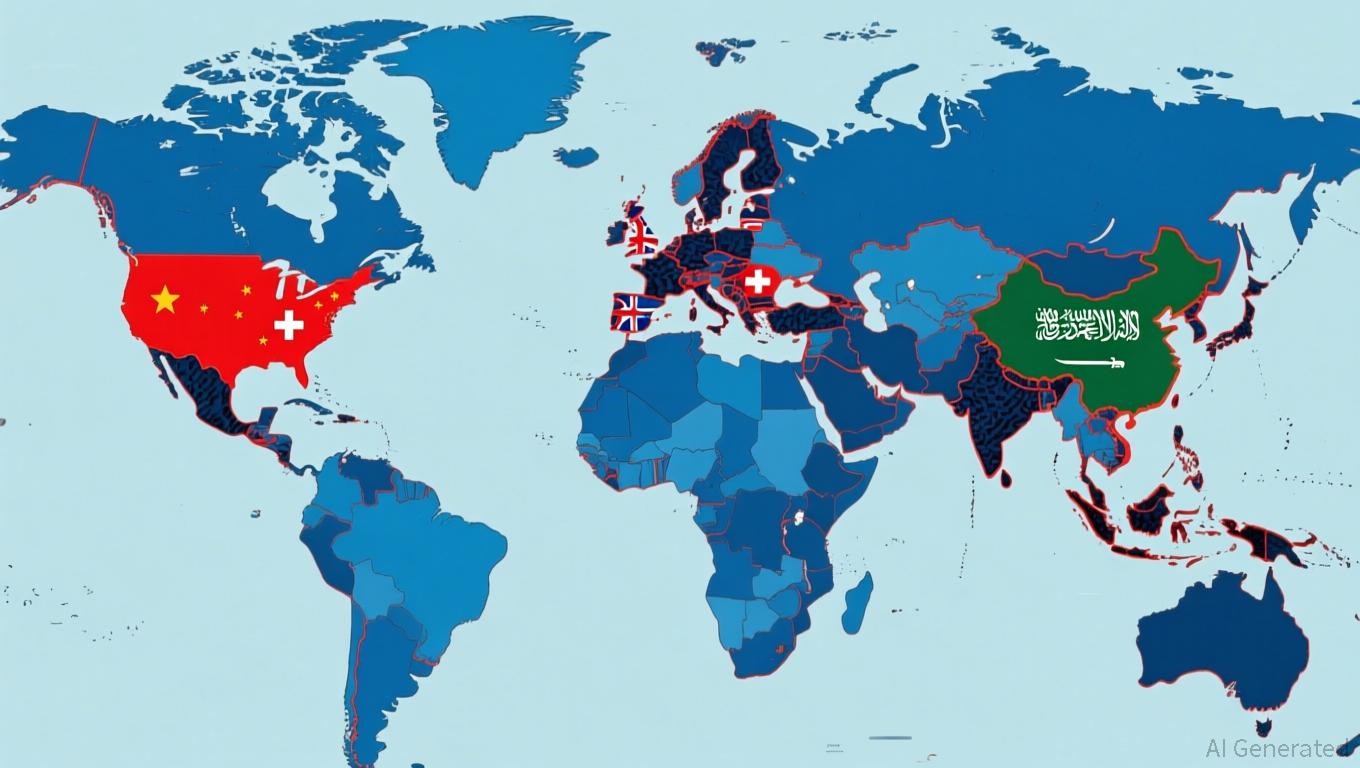Stablecoins Connect Financial Sectors as Total Supply Exceeds $300 Billion
- Stablecoin supply surpassed $300B in 2025, with USDT (58%), USDC ($74B), and USDe ($14B) leading the market. - Regulatory clarity via the U.S. GENIUS Act reduced uncertainty, while yield-bearing stablecoins (7.39%-8.98% APY) drove adoption. - Market growth accelerated 63% YoY, fueled by $4.1T monthly transactions and 30M active wallets in DeFi and cross-border payments. - Projections suggest $2T potential as stablecoins bridge traditional finance and crypto, though CBDCs and regulatory fragmentation pose

The stablecoin market has reached an unprecedented total supply of $300 billion, representing a significant achievement for the crypto industry. As of September 2025, CoinMarketCap reports the market at $307 billion, while CoinGecko and DeFiLlama list slightly lower numbers at $299 billion and $295.5 billion. This rapid expansion highlights the increasing role of stablecoins as a link between conventional finance and decentralized platforms. Tether’s
The increasing use of stablecoins demonstrates their expanding importance in international payments, DeFi, and institutional transactions.
Yield-generating stablecoins, often called “Stablecoin 2.0,” are transforming the market. Projects like Ethena’s USDe, Falcon Finance’s USDf, and Aave’s GHO offer annual yields between 7.39% and 8.98%, drawing interest from both individual and institutional investors. DWF Ventures, a Web3 investment firm, observed that these yield-bearing stablecoins have captured a notable share of the market, with USDe alone reaching $13.7 billion in supply. These coins generate returns from various sources, such as real-world assets (RWAs), staking, and DeFi arbitrage, while staying pegged to the U.S. dollar. Falcon Finance’s USDf, for example, has expanded to $1.8 billion in supply, supported by its governance structure and compatibility with multiple blockchains DWF Ventures Analyzes Stablecoin Growth As Market Cap Nears … [ 3 ].
Regulation continues to play a vital role. The GENIUS Act has established a regulatory framework for stablecoins, fostering innovation while managing risks. Nonetheless, obstacles remain, such as scrutiny from the European Central Bank and ongoing transparency issues. For instance, Tether’s reserves consist of 79.7% U.S. Treasury securities and 4.4% in
Looking forward, projections indicate further growth. U.S. Treasury Secretary Scott Bessent anticipates stablecoins could reach a $2 trillion market cap in the next few years, driven by their ability to provide efficient, programmable money.
Disclaimer: The content of this article solely reflects the author's opinion and does not represent the platform in any capacity. This article is not intended to serve as a reference for making investment decisions.
You may also like
Switzerland Delays Crypto Information Exchange Pending International Coordination
- Switzerland delays crypto tax data sharing with foreign nations until 2027, citing unresolved CARF partner agreements. - The OECD's 2022 framework requires member states to exchange crypto account details, but 75 countries including the EU and UK face implementation challenges. - Transitional measures ease compliance burdens for Swiss crypto firms while awaiting finalized international data-sharing protocols. - Major economies like the U.S., China, and Saudi Arabia remain outside CARF due to non-complian

Bitcoin Updates: SGX Addresses Offshore Perp Shortfall as Bitcoin Decline Increases Demand for Hedging
- SGX launched Bitcoin and Ethereum perpetual futures, becoming a first-mover in regulated onshore crypto derivatives to meet institutional demand. - The $187B/year perp market, dominated by Asia, now gains a regulated alternative to offshore platforms with SGX's 22.5-hour trading window. - Perps enable hedging during Bitcoin's 2025 downturn, with SGX's margin-call system prioritizing investor protection over instant liquidations. - Regulatory caution limits access to accredited investors, aligning with gl

Bitcoin News Update: Institutional ETF Adjustments Challenge Key Bitcoin Support Thresholds
- Analysts warn Bitcoin faces 25% drop risk if key support levels fail amid shifting institutional ETF dynamics. - Texas's $5M IBIT purchase highlights growing government interest, but ETFs fall short of direct BTC ownership criteria. - Technical analysis shows Bitcoin trapped in a broadening wedge pattern, with breakdown below $80,000 risking $53k decline. - Institutional rebalancing sees $66M IBIT outflows vs. $171M FBTC inflows, signaling tactical ETF rotation over accumulation. - Abu Dhabi's $238M ETF

XRP News Today: IMF Cautions That Rapid Tokenized Markets Could Intensify Crashes in the Absence of Regulation
- IMF warned tokenized markets like XRP could worsen flash crashes without regulation, citing risks from decentralized systems lacking traditional safeguards. - Report acknowledged tokenization's potential to cut cross-border payment costs but highlighted volatility risks from rapid liquidity loss seen in crypto markets. - SEC's approval of crypto ETFs signals growing institutional acceptance, though regulators emphasize oversight frameworks to mitigate systemic risks. - IMF proposed a global digital marke
